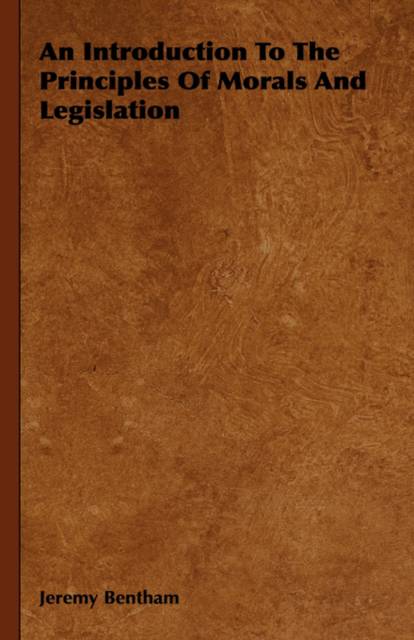
- Afhalen na 1 uur in een winkel met voorraad
- Gratis thuislevering in België vanaf € 30
- Ruim aanbod met 7 miljoen producten
- Afhalen na 1 uur in een winkel met voorraad
- Gratis thuislevering in België vanaf € 30
- Ruim aanbod met 7 miljoen producten
Zoeken
€ 71,95
+ 143 punten
Uitvoering
Omschrijving
AN INTRODUCTION TO THE PRINCIPLES OF MORALS AND LEGISLATION by JEREMY BENTHAM. First published in 1789. PREFACE: THE following sheets weref. As the note on the opposite page expresses, printed so lojag ago as the year 1780. The design, in pursuance of which they were written, was not so extensive as that announced by the present title. They had at that time no other destination than that of serving as an introduction to a plan of a pemil code in terminis, designed to follow them, in the same volume. The body of the work had received its completion according to the then present extent of the authors views, when, in the investigation of some Haws he had discovered, he found himself unexpectedly entangled in an unsuspected corner of the meta physical maze. A suspension, at first not apprehended to be more than a temporary one, necessarily ensued suspension brought on coolness, and coolness, aided by other concurrent causes, ripened into disgust. Imperfections pervading the whole mass had already pointed out by the sincerity of severe and discerning friends and conscience had certified the justness of their censure. The inordinate length of borne of the chapters, the apparent inutility of others, and the dry and metaphysical turn of the whole, suggested an apprehension, that, if published in its present form, the work would contend under great disadvantages for any chance, it might on other accounts possess, of being read, and consequently of being of use. But, though in this manner the idea of completing the pre sent work slid insensibly aside, that was not by any means the case with the considerations which had led him to engage in it. Every opening, which promised to afford the lights he stood in need of, was still pursued as occasion arose, the several depart ments connected with that in which he had at first engaged, were successively explored insomuch that, in one branch or other of the pursuit, his researches have nearly embraced the whole field of legislation. Several causes have conspired at present to bring to light, under this new title, a work which under its original one had been imperceptibly, but as it had seemed irrevocably, doomed to oblivion. In the course of eight years, materials for various works, corresponding to the different branches of the subject of legislation, had been produced, and some nearly reduced to shape and, in every one of those works, the principles exhibited in the present publication had been found so necessary, that, either to transcribe them piece-meal, or to exhibit them somewhere where they could be referred to in the lump, was found unavoidable. The former course would have occasioned repetitions too bulky to be employed without necessity in the execution of a plan unavoidably so voluminous the latter was therefore indisputably the preferable one. To publish the materials in the form in which they were already printed, or to work them up into a new one, was therefore the only alternative the latter had all along been his wish, and, had time and the requisite degree of alacrity been at command, it would as certainly have been realised. Cogent considerations, however, concur, with the irksomeness of the task, in placing the accomplishment of it at present at an unfathomable distance. Another consideration is, that the suppression of the present work, had it been ever so decidedly wished, is no longer altogether in his power. In the course of so long an interval, various inci dents have introduced copies into various hands, from some of which they have been transferred, by deaths and other accidents, into others that are unknown to him...
Specificaties
Betrokkenen
- Auteur(s):
- Uitgeverij:
Inhoud
- Aantal bladzijden:
- 436
- Taal:
- Engels
Eigenschappen
- Productcode (EAN):
- 9781443723213
- Verschijningsdatum:
- 4/11/2008
- Uitvoering:
- Hardcover
- Formaat:
- Genaaid
- Afmetingen:
- 140 mm x 216 mm
- Gewicht:
- 698 g

Alleen bij Standaard Boekhandel
+ 143 punten op je klantenkaart van Standaard Boekhandel
Beoordelingen
We publiceren alleen reviews die voldoen aan de voorwaarden voor reviews. Bekijk onze voorwaarden voor reviews.











